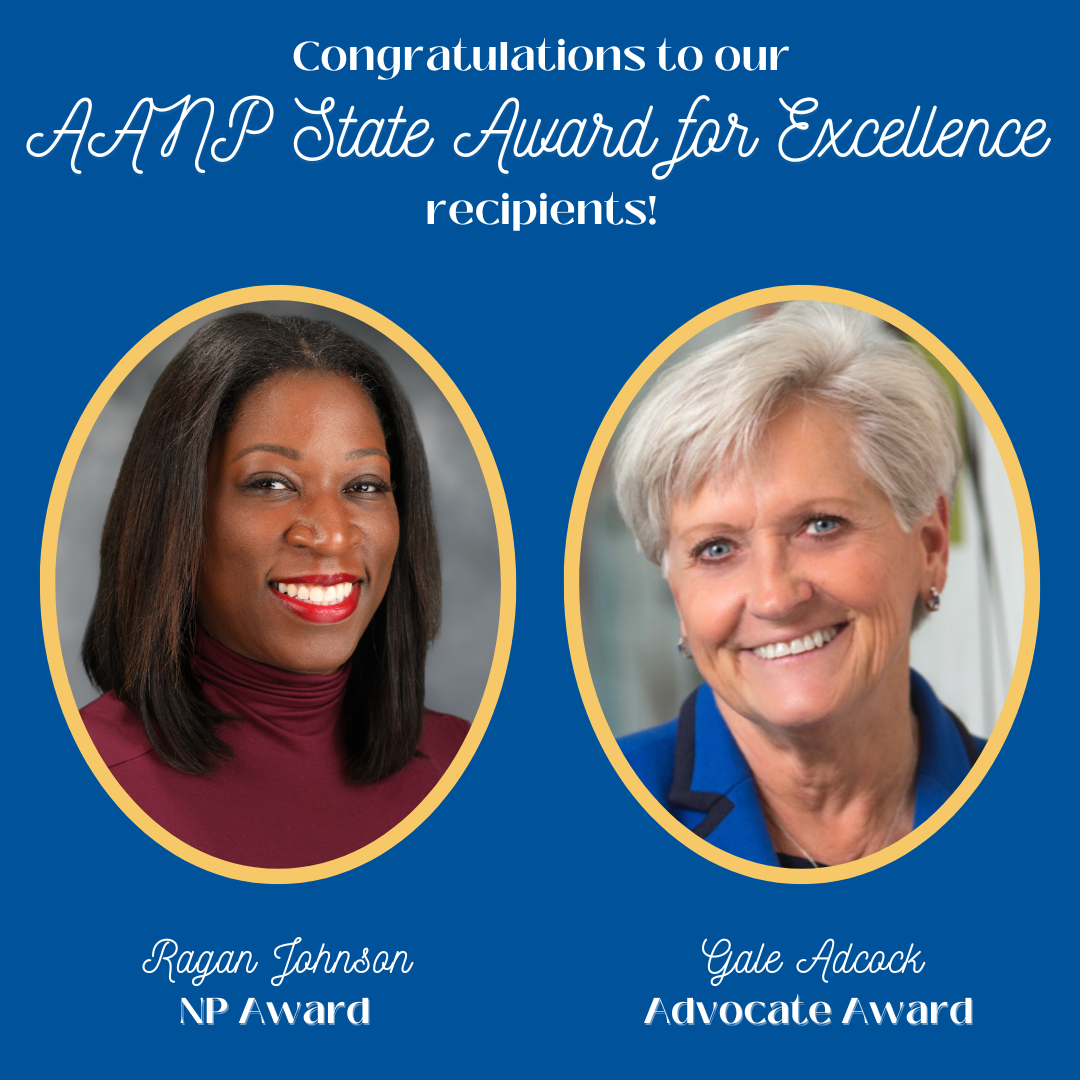Johnson, Adcock Recognized for Accomplishments with AANP State Award for Excellence
AANP has awarded Ragan Johnson the NP Award for her health equity work and Rep. Gale Adcock the Advocate Award for her leadership as a member of the North Carolina House of Representatives and advocacy leadership.

Editor's Note: This story originally appeared in the Spring/Summer 2022 magazine.
Two Duke University School of Nursing-affiliated nurse practitioners (NPs) have received the 2022 American Association of Nurse Practitioners (AANP)’s State Award for Excellence for North Carolina—a reflection of their dedication to the field of advanced practice nursing. AANP has awarded Ragan Johnson, DNP, FNP-BC, CNE, associate professor, the NP Award for her health equity work, and Rep. Gale Adcock, consulting associate and former School of Nursing Board of Visitors member, the Advocate Award for her leadership as a member of the North Carolina House of Representatives and advocacy leadership.
Johnson and Adcock develop and disseminate nurse-led models of health care to reduce health disparities and strengthen nurse leadership in policy making.
“[Nurses] are the key to reaching health equity,” Johnson says. “As the most trusted profession, we can bridge the gap of medical distrust for communities most impacted by health disparities just with our patient-first mindset to care. We are using our voices to impact health policy at the local, state, and national level. We understand what the systematic barriers are that need to be removed, and we have the answers for designing the system to replace the one that is not working.”
Ragan Johnson, NP Award
“I am extremely honored to receive an award of this magnitude. To have been recognized by my peers in this way means so much to me,” says Ragan Johnson.
Anne L. Derouin, DNP’10, RN, MSN’00, CPNP, FAANP, assistant dean, Master of Science in Nursing (MSN) Program, and professor, nominated Johnson due to her efforts as the program’s chair, including leading the process to introduce diversity, equity, inclusion, and belonging statements to the syllabi. These statements have been implemented throughout the school and proved crucial in creating the Leading to Equitable Access to Health Professions (LEAHP) Program, a mentorship opportunity offered through the Office of Diversity, Equity and Inclusion. The program welcomed its first cohort in June 2021, when the Health Equity Academy and the MSN Program partnered with North Carolina Central University (NCCU) to present a weeklong summer immersion program to five BSN students from NCCU and North Carolina A&T State University. Johnson’s output has garnered national attention, resulting in requests for consultation on how the framework can be implemented at other schools of nursing.
A mentor at Tennessee State University encouraged Johnson to pursue the NP profession; Johnson went on to earn a MS in nursing and a DNP with a public health concentration from The University of Tennessee Health Science Center. Johnson focuses on improving health equity and caring for patients from underserved communities through practice, advocacy, and research. Her focus on health care reform for the Black community stems from her family’s experiences.
“My great-grandfather was refused care in the South and was left without full use of one of his arms,” she says. “I knew I would do something to change who patients see when they need health care and how that care was delivered.”
Johnson serves as the co-investigator for The HEEAT Research Lab, led by Schenita D. Randolph, PhD, MPH, RN, CNE, associate professor. Comprising an interdisciplinary team of researchers, clinicians, entrepreneurs, and community members, the lab operates two programs designed to reduce health inequities in the Black community around HIV and sexual health.
“My passion is to reach health equity and eliminate HIV, particularly in the Black community,” Johnson says.
Gale Adcock, Advocate Award
Gale Adcock, a family NP of 35 years, is the first and only advanced practice registered nurse (APRN) to serve in the state legislature. She was nominated for advocacy efforts during her four terms in the NC House of Representatives where she holds the position as deputy Democratic leader. Especially notable are her efforts to pass APRN full practice authority, known as the SAVE Act, of which she is a primary sponsor. The SAVE Act would eliminate the state’s requirement for physician supervision of NPs and modernize the regulation of all APRN practice.
“Advocacy by NPs is truly advocacy for patients,” Adcock says. “Often, NPs provide care for individuals and communities who have no voice in the policy arena. We must speak for them, as well as for ourselves, if we want to see legislation and regulations that serve people in the ways they deserve.”
During Adcock’s career, she has served as the chief health officer for global software company SAS for 26 years, president of the North Carolina Nurses Association, chair of the North Carolina Center for Nursing and was a two-term member of the North Carolina Board of Nursing. She received her BSN from East Carolina University and her MSN and FNP from the University of North Carolina at Chapel Hill.
As a public health nurse in the early 1980s, Adcock observed the autonomy, influence, and partnership with patients that NPs have and it motivated her to advance her career by becoming an NP.
“NPs have an unparalleled skillset that makes us effective leaders and problem solvers in all settings,” she says. “To broaden our influence and impact, NPs must think beyond traditional leadership roles in health care settings. More NPs need to hold elected and appointed offices at all levels of government.
“As health care providers who care for people in their totality—as individuals who are also part of families and communities—NPs are well-prepared and well-positioned to use data and tell stories that illustrate the changes needed in health care access, delivery and outcomes,” says Adcock.